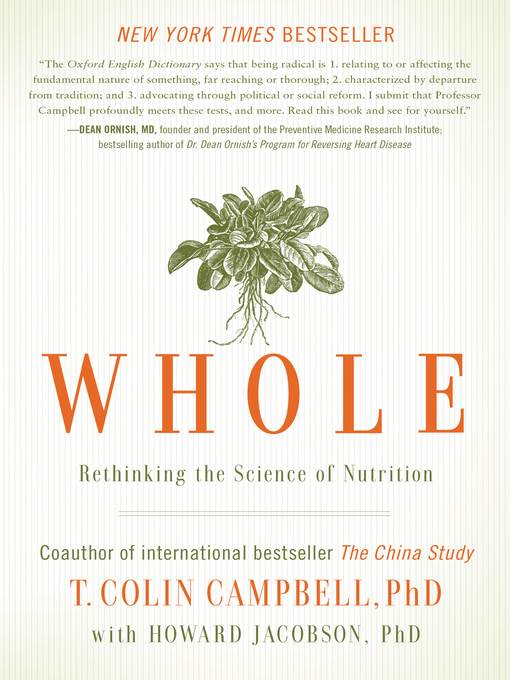
Whole
Rethinking the Science of Nutrition
فرمت کتاب
ebook
تاریخ انتشار
2013
نویسنده
Howard Jacobsonناشر
BenBella Books, Inc.شابک
9781937856250
کتاب های مرتبط
- اطلاعات
- نقد و بررسی
- دیدگاه کاربران
نقد و بررسی

June 10, 2013
Campbell's follow-up to his best-selling The China Study is more of the same, in the best way. He continues his quest to convince people that "the ideal human diet looks like this: Consumer plant-based foods in forms as close to their natural state as possible...eat a variety of vegetables, fruits, raw nuts and seeds, beans and legumes, and whole grains." The entirety of the book is a passionate and convincing case for that ideal diet. Campbell has not written a book of diet tips, or even provided recipes. In fact, at times the book delves so deeply into scientific processâ for example, explaining how cancer develops or how metabolism worksâthat many may find themselves having to read slowly to understand his point. Yet he makes the case that Americans are too prone to take pills to solve health issues (and doctors too prone to prescribe them) as a result of "reductionist thinking". His years of scientific study and calm, measured tone are highly convincing, making a firm case that changing one's diet is the best way to assure good health. Readers will be inclined to put down their processed food snacks once they read what could be a life-changer of a book.

March 15, 2013
Campbell (Emeritus, Nutritional Biochemistry/Cornell Univ.; The China Study: The Most Comprehensive Study of Nutrition Ever Conducted and the Startling Implications for Diet, 2005) elaborates on the themes of his earlier book and the 2011 documentary film Forks Over Knives. In 1980, the author began a study with Chinese scientists to investigate how the transformation of the Chinese diet in the aftermath of the stringencies of the Cultural Revolution affected the health of a sample of 100 Chinese families living in two different rural counties. A comparison with mortality statistics 20 years earlier showed a significant increase with the introduction of more protein in their diets. While admitting that these conclusions (taken from the original China study) are based on correlations and do not establish causality, Campbell does base his dietary recommendations on those conclusions. He claims that the adoption of a whole-foods, plant-based lifestyle can prevent 95 percent of all cancers, nearly all heart attacks and strokes, and even reverse severe heart disease. The author cautions against the use of dietary supplements and multivitamins and rejects the potential of targeted drugs as well as traditional medical remedies such as chemotherapy and radiation. He attempts to buttress his conclusions by referring to experiments conducted on rats in which the incidence of cancer was significantly higher for those fed a diet high in animal protein. Campbell dismisses the failure of medical and scientific journals to publish papers that he has written over the years, attributing this to biased peer review and financial pressure from doctors, the pharmaceutical industry, and dairy and livestock producers. While his earlier book had impressive sales figures, he complains that the media has failed to showcase his work. A spirited but unconvincing defense of Campbell's earlier work.
COPYRIGHT(2013) Kirkus Reviews, ALL RIGHTS RESERVED.

























دیدگاه کاربران